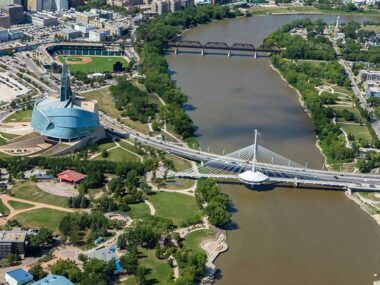In 2026, trade jobs have become one of the most realistic and rewarding immigration pathways for workers around the world. While many people assume they need a university degree to move abroad and earn a high salary, countries like Canada, Australia, New Zealand, and parts of Europe are proving otherwise.
Skilled trades — including welding, trucking, plumbing, electrical work, HVAC, and other hands-on roles — are now at the heart of global immigration programs. These jobs often pay $60,000–$120,000+ annually and are officially listed as “in-demand” in multiple national shortage lists, meaning foreign workers can get job offers, work visas, and even permanent residency (PR) faster than many professionals.
This guide explores which trades are in high demand, how much they pay, and how you can use these roles to immigrate successfully in 2026.
Why Trade Jobs Are a Strong Pathway for Immigrants
Trade careers used to be undervalued, but in 2026, they’re essential to the global economy. Here’s why:
-
Retiring Workforce: Many tradespeople in North America, Europe, and Australia are reaching retirement age, leaving tens of thousands of vacancies.
-
Infrastructure Growth: Housing projects, renewable energy initiatives, and logistics networks need workers now.
-
Immigration-Friendly: Countries are lowering barriers for trades because of urgent shortages.
-
High Salaries Without Degrees: Trades allow workers to earn well above average wages with minimal university education requirements.
Governments have added these jobs to their official shortage or priority occupation lists, meaning immigrants with trade skills are highly sought after.
1. Welding Jobs for Immigrants
Welding is a highly transferable skill, making it one of the most popular trades for immigrants. Welders are in demand in Canada, Australia, and the U.S., especially for infrastructure, shipbuilding, and oil and gas sectors.
Average Welding Salaries (2026)
| Country | Annual Salary Range | Notes |
|---|---|---|
| Canada | CAD $50,000 – $90,000 | Specialty welders in Alberta can earn $100K+ |
| Australia | AUD $65,000 – $90,000 | Overtime raises pay significantly |
| United States | USD $50,000 – $80,000 | Pipe welders, underwater welders earn much more |
| Germany | €40,000 – €60,000 | Demand in industrial sectors |
Immigration Pathways for Welders
-
Canada: Welders are in NOC TEER 2 (code 72106) and listed on multiple Provincial Nominee Programs (PNPs), including Saskatchewan and Manitoba.
-
Australia: The Skilled Occupation List includes welders, eligible for subclass 189, 190, and 491 visas.
-
New Zealand: Welders are on the Green List, offering a clear route to residency.
2. Truck Driving Careers Abroad
Truck drivers have become some of the highest-paid blue-collar workers globally due to e-commerce growth, supply chain demands, and worker shortages. In countries like Canada, trucking is a direct pathway to permanent residency.
Truck Driver Salary Comparison (2026)
| Country | Annual Salary Range | Highlights |
|---|---|---|
| Canada | CAD $60,000 – $100,000+ | Long-haul and owner-operators earn six figures |
| USA | USD $55,000 – $90,000 | Specialized trucking earns higher wages |
| Australia | AUD $70,000 – $100,000 | Remote area work pays premium |
| UK | £35,000 – £50,000 | Logistics shortages boost wages |
Immigration Options for Truck Drivers
-
Canada: Truck drivers are officially recognized under NOC 73300. Provinces like Ontario, Saskatchewan, and Nova Scotia have trucking-specific PNP streams.
-
Atlantic Immigration Program (AIP): Allows truckers to secure PR directly without LMIA.
-
Australia: Heavy vehicle drivers can immigrate under skilled visa subclasses.
3. Electricians and Plumbers
Electricians and plumbers are consistently in global shortage lists. They are essential for construction, residential, and commercial projects.
| Country | Electrician Salary (Annual) | Plumber Salary (Annual) |
|---|---|---|
| Canada | CAD $65,000 – $95,000 | CAD $60,000 – $85,000 |
| Australia | AUD $80,000 – $100,000 | AUD $75,000 – $95,000 |
| UK | £35,000 – £55,000 | £32,000 – £50,000 |
| Germany | €40,000 – €60,000 | €38,000 – €55,000 |
Immigration Programs for Electricians & Plumbers
-
Both trades are part of Canada’s Express Entry and PNP pathways.
-
Australia’s Skilled Independent Visa (189) and Employer Sponsored Visa (186) are popular for these roles.
-
New Zealand’s Green List offers a fast-track residency for qualified electricians and plumbers.
4. HVAC Technicians and Mechanics
Heating, ventilation, and air conditioning (HVAC) specialists are needed worldwide. Mechanics, especially those skilled in diesel and heavy machinery, are equally sought after.
| Country | HVAC Technician Salary | Heavy Equipment Mechanic Salary |
|---|---|---|
| Canada | CAD $60,000 – $85,000 | CAD $65,000 – $90,000 |
| USA | USD $50,000 – $75,000 | USD $55,000 – $85,000 |
| Australia | AUD $70,000 – $90,000 | AUD $75,000 – $95,000 |
These roles are widely featured in PNP and regional migration lists, meaning immigrants with this expertise have excellent prospects.
5. Construction Supervisors and Skilled Labor
While general labor roles don’t always qualify for PR, construction supervisors and specialized trades (like crane operators or steel fixers) are priority roles.
| Role | Salary (Canada) | Salary (Australia) | Salary (UK) |
|---|---|---|---|
| Construction Supervisor | CAD $80K – $100K | AUD $90K – $110K | £40K – £55K |
| Crane Operator | CAD $75K – $95K | AUD $85K – $105K | £38K – £50K |
Why These Jobs Lead to Permanent Residency
Trade jobs are not only lucrative but also recognized by immigration authorities. Here’s why they work so well for PR:
-
On Shortage Lists: Most trade jobs appear on priority occupation lists.
-
Employer Sponsorship: Tradespeople often receive visa sponsorship offers.
-
Faster PR Processing: PNP nominations in Canada or the Green List in NZ fast-track permanent residency.
-
Pathways Without Degrees: Skilled trades emphasize certifications and experience rather than university education.
How to Qualify for Trade Job Immigration
-
Get Certified:
-
Most countries require credential recognition.
-
Welders, electricians, and plumbers often take local licensing exams.
-
-
Language Proficiency:
-
IELTS or CELPIP (Canada), or PTE/IELTS (Australia/NZ) are mandatory.
-
-
Secure a Job Offer:
-
Use job portals or recruitment agencies that specialize in skilled trades.
-
-
Apply for Work Permit or PR:
-
In many cases, tradespeople can skip temporary work permits and go straight to PR through Express Entry, PNPs, or Green Lists.
-
-
Bring Your Family:
-
Most trade visas allow spouses to work and children to study.
-
Top Countries for Trade Job Immigration in 2026
| Country | Visa Programs | Typical Salary Range | Key Advantage |
|---|---|---|---|
| Canada | Express Entry, PNP, AIP | CAD $60K–$100K+ | Direct PR pathways for trades |
| Australia | Skilled Independent (189), 491 Visa | AUD $75K–$110K | Regional sponsorship benefits |
| New Zealand | Green List Straight-to-Residence | NZD $70K–$95K | Fast-track PR approval |
| UK | Skilled Worker Visa | £35K–£55K | Growing demand in logistics/construction |
| Germany | EU Blue Card | €40K–€65K | Easier access for vocational skills |
The Future of Skilled Trades for Immigrants
Trade jobs are no longer just an option for those avoiding a degree—they are highly respected, high-paying careers that offer global mobility. In many cases, a skilled welder or electrician can immigrate more easily than a university graduate, because these professions are desperately needed everywhere.
In 2026, if you want a practical and guaranteed path to a new life abroad, trades are one of the smartest routes to take.
Conclusion
High-paying trades like welding, trucking, plumbing, and electrical work are the backbone of immigration programs in Canada, Australia, New Zealand, and beyond. With salaries ranging from $60,000 to $120,000+ annually, these roles offer not only financial stability but also a fast track to permanent residency.
If you’re skilled in a trade — or willing to retrain — your expertise is in demand. The world is looking for more welders, truckers, electricians, HVAC specialists, and mechanics. These professions are essential, future-proof, and come with immigration benefits that university degrees don’t always guarantee.
Now is the time to leverage your skills, secure a job offer, and start a new chapter in a country that values what you do.

